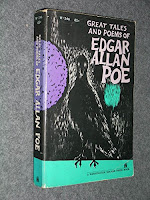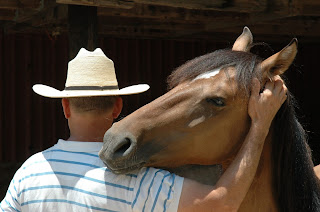Great Tales and Poems of Edgar Allan Poe -- 1965
This is day 10 of the challenge to list books that influenced me as a child. I’m a bit sad that it’s come to an end, as I’ve really enjoyed remembering, researching (to find images and refresh my memory), and sharing that with you.Anyway, I decided to include Poe because I suspect a lot of people bridge that gap from YA reading to adult reading by reading Poe – just a guess based on what my students over the years have told me. About the same time I was wearing out this paperback version of Poe (hence, the 1965 publication date – which would have put me in high school), I also had a book of Rod Serling (of Twilight Zone fame) short stories that rivaled Poe’s. I thrilled in the weirdness, the scariness, the psychological suspense.
This new-found sense of the creepy was reinforced by Serling’s weekly series (1954-69) and the Roger Corman/Vincent Price movies shown at Saturday matinees – especially
 |
| Peter Lorre and Vincent Price in A Cask of Amontillado |
There were also full-length movies of The Pit and the Pendulum and Masque of the Red Death (1964), the last of which I went to see because Beatle Paul McCartney’s girlfriend, Jane Asher, was in it. Its only redeeming quality was that it was another Corman/Price effort, but it was a real turkey. Some of his poems are memorable for the images or sounds Poe creates – the finality of “Nevermore” or the tolling of "The Bells," but his stories are what I enjoyed. And if you are wondering if I have a favorite, I don’t even have to think. It’s "The Tell-Tale Heart," creepy and haunting and memorable.
I hope you have enjoyed this little trip through my reading memories. Thanks to JT Scott for the challenge.
Flowers for Algernon -- Daniel Keyes --1966
Okay – bad news. I was having so much fun with the 10-day challenge to list influential books of one’s childhood that when my original challenger, JT Scott (just so you know who to blame) challenged me to 10 more (if he agreed to do the same), I was in. So, I’m back.In searching for 10 more books to discuss, I made it a point to avoid books assigned in school, although at least one was eventually a reading assignment). I want to highlight books I chose myself. This effort was aided by a membership in a book club. I can’t imagine how I paid for these books, although I did have a job waiting tables in high school. Maybe my dad and I had entered some kind of agreement.
So, the book I’ve chosen for today is Flowers for Algernon by Daniel Keyes. I must have read this book soon after it was published in 1966, and one of the themes, treatment of those who are mentally or learning disabled has stayed with me. Charlie Gordon is a 32-year old disabled man who is involved in an experiment that allows his intellect and emotions to grow and mature. But the effects aren’t permanent, and we read in his journal notes how he gradually loses all that he gained. In between, we see that as Charlie’s intellect grows, his personal relationships deteriorate. What really struck me in the end, as Charlie chooses to live in a state institution, is that he can remember having an IQ of 185, even though he no longer does. Algernon is the name of a mouse, upon which the surgical procedure Charlie undergoes was first performed. In the end, Charlie requests that flowers are placed on the mouse’s grave at his former residence.
I learned some time after I read the book that Flowers for Algernon that it was first a short story. Keyes was encouraged to develop it into a short story, but it was suggested that he change the ending so that Charlie keeps his intelligence and marries the woman he falls in love with during his mental growth. But Keyes refused and went through several publishers, all who wanted the happy ending, until he found one that would publish his novel as is. Since then, it has never been out of publication. It was made into a movie in 1968, starring Cliff Robertson (Academy Award) and Claire Bloom.



Comments